For centuries, mushrooms have been utilized by Eastern cultures for their healing compounds to help prevent disease and treat ailments in the human body. In more recent years, the Western world has taken notice of these nutrient-dense organisms and their potential healing powers - especially with chronic disease, cancer, and more on the rise.
Today, we are seeing more and more medicinal mushroom products hit the market in health food stores across the United States.
Why are people starting to utilize fungi for health needs?
Well, because medicinal mushroom use has a lot of promising research to suggest the efficacy for use is there.
The foundational piece of this research is that many medicinal mushrooms contain immune-boosting nutrients like antioxidants, beta-glucans, and various vitamins and minerals. Beta-glucans have been widely studied to help with cancer-fighting effects in the body and are known as a potential immunotherapy aid for many well-known diseases.
Dive further into learning about beta-glucans by reading our blog post on the topic.
With heart disease being the leading cause of death for men and women across most races in the United States, medicinal mushroom supplementation alongside traditional treatments is gaining traction and interest from the medical community.
Numerous studies have been conducted on medicinal mushroom effects on metabolic markers such as LDL, HDL cholesterol, fasting triacylglycerol, homocysteine, blood pressure, homeostatic function and oxidative and inflammatory damage. It was shown that consumption may reduce the risk of suffering from cardiovascular diseases.

The particular mushroom species that are linked to heart health benefits include reishi, shiitake, and oyster mushrooms.
In this blog post, we’ll cover what information we know today about medicinal mushrooms being used to treat heart disease. It’s important to note that as we discuss this topic, there’s still a lot more studies that are being conducted. The below information is inexhaustive, and more research needs to be completed.
Let’s learn more about the use of medicinal mushrooms for heart disease.
Understanding mushrooms and heart disease
In traditional Chinese medicine, mushrooms have been used to help with cardiovascular health - especially reishi, shiitake, and oyster mushrooms. Why these three in particular? Well, because they have some similarities in makeup. To start, all three have a fleshy texture that can be cooked and eaten to reap the benefits of their fiber and antioxidant compounds. Antioxidant phenolic compounds and a high presence of fiber are linked to slowing the progression of heart disease.
Furthermore, shiitake and oyster mushrooms both have well-known and documented cholesterol-lowering effects. Regular consumption of reishi mushrooms may provide a special cardiovascular health boost because of the presence of triterpenes that improve circulation and reduce inflammation.
Read more about reishi mushroom benefits here.
With numerous studies backing up the use of these three mushroom species for aiding in heart health, let’s look at the compounds found in these mushrooms that give them their power.
Antioxidant phenolic compounds: what they are, and why they’re important for heart function
Antioxidant phenolic compounds are phytochemicals found in the tissue of various darkly colored fruits and vegetables. Phenolic compounds include flavonoids, phenolic acids, and polyphenols, and are considered a protective element that grows as a plant is introduced to harsh elements outdoors.
Some studies show that antioxidant phenolic compounds have anti-aging effects and may help with overall health and wellbeing when consumed regularly.
While polyphenols are not absolutely necessary to live, the regular consumption of phenolic compounds may help with longevity and overall health. Since everything is connected to the heart…that’s a good place to start.
Research shows polyphenols can help with:
- Blood pressure levels
- Blood vessel health and flexibility
- Circulation
- Chronic heart inflammation
This leads us to the topic of antioxidant phenols and heart disease.
A number of studies, including this one, have shown people who have a diet rich in phenolic compounds may reduce their risk of developing heart disease. Why? Because the antioxidant compounds found in phenolic compounds may help in preventing lipoprotein oxidation and atherosclerotic lesions.
Mushroom fiber content and heart health
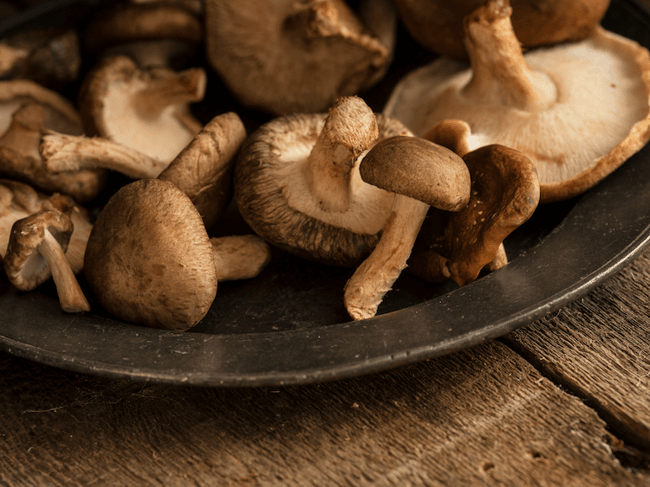
Mushrooms have long been regarded as the highest-fiber food around (on a dry weight basis) because most mushrooms contain up to 95% water.
There are numerous types of fiber in the makeup of most mushrooms including beta-glucans and chitin - both of which are not digestible in the upper digestive tract in raw or lightly cooked formats.
If you simply stir fry or eat the mushroom raw, your body will digest them as a prebiotic that will help with overall gut health. However, if you want to reap the full benefits of beta-glucans and chitin, there is a way!
Since these compounds are located in the cell walls of the mushroom, you must break them down using high heat processes that make them more bioactive. We’re not going to dive too deep into that in this blog post, but check out this one for more information.
Last but not least, and just to put a (mushroom) cap on this part of the article, we took a look at a study conducted on rats that analyzed the cholesterol-lowering effects of various mushroom fibers. Overall, the consumption of mushroom powder (aka their fibers) shown to lower harmful cholesterols in the body.
With mushrooms being high in phenolic compounds and fiber, it’s no wonder that they’ve been considered a potential way to consume these beneficial nutrients.
With that in mind, let’s look at some studies that have connected mushroom consumption with cholesterol regulation, heart benefits, and better circulation throughout the body.
Mushrooms and cholesterol regulation
Regular mushroom consumption has been connected to cholesterol regulation in the body. The presence of triterpenes in mushrooms is largely owed the title of the true hero for cholesterol regulation - after all, these well-studied active compounds provide action mechanisms for pharmacological effects of medicinal plants (e.g., mushrooms) to be used against common diseases.
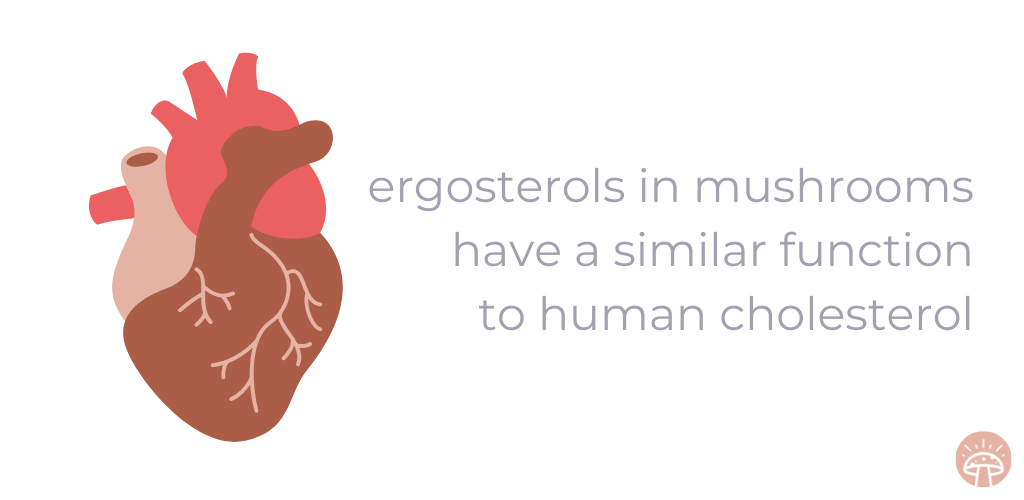
To further understand the connection between mushroom consumption and cholesterol lowering benefits, we took a look at a highly-regarded, comprehensive research study that looked at 1479 studies on heart health and treatments. In this study review, the team identified seven studies showing edible mushroom consumption may have favorable effects on lipid profiles by changing some metabolic markers such as low-density lipoprotein (LDL) cholesterol, high-density lipoprotein (HDL) cholesterol, total cholesterol, and triglycerides. Well, then…
Now that we’ve outlined the general connection between medicinal mushroom use and potential heart health benefits, let’s look at the specific mushrooms linked to heart health - reishi, shiitake, and oyster mushrooms have entered the building.
Heart benefits of reishi mushrooms
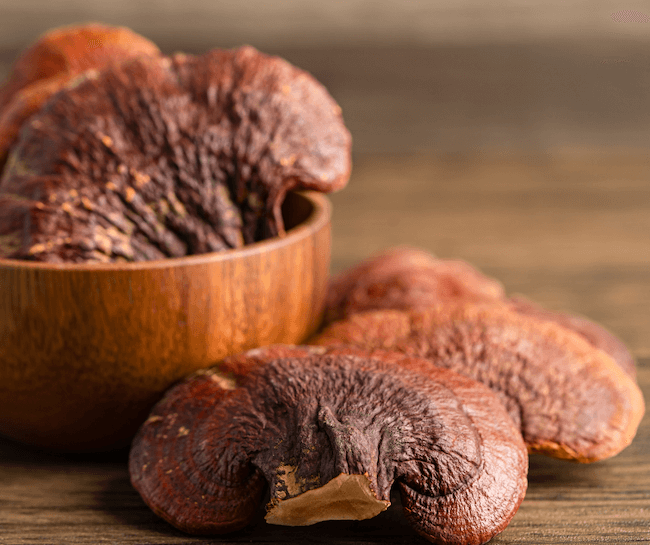
Reishi has been the leading seller of medicinal mushroom products in recent years because of its wide breadth of potential health benefits. In the last 18 years, over 800 articles have been put out on reishi mushrooms for health benefits - while clinical trials are still lacking on the subject, there are a few promising studies that link reishi consumption to various health benefits.
At the top of that list? Heart health.
It’s been shown that reishi mushrooms benefit the heart by regulating cholesterol, and reducing blood pressure and blood sugar levels. While studies on the subject are still in the beginning stages, reishi has been used by Asian cultures for centuries to help with cardiovascular benefits.
If you’ve read any of our other articles, chances are you’ve seen mention of the fact that Eastern cultures have used mushrooms for centuries and that the Western world is just catching up. The same can be said for clinical trials and scientific studies - but we imagine it’s coming.
In the meantime, let’s review the studies that are completed at this time:
In a comparative study on patients with chest pain, 37 high risk patients and 34 stable patients took 750 mg of residi polysaccharide peptide (PSP) complex. In both groups, antioxidant levels in the blood increased and risk factors for good blood vessel damage improved over time.
With reishi supplements being very high in beta-glucan count, they also serve as a great treatment for various cancers as an immunotherapy option and overall immune system care.
While those things don’t directly mention heart health, if we care for our immune system as a whole, the heart will be better off for it.
If you're thinking about supplementing reishi mushrooms into your diet, a good place to start is our articles on dosage and the best powder brands out there.
Heart benefits of shiitake mushrooms
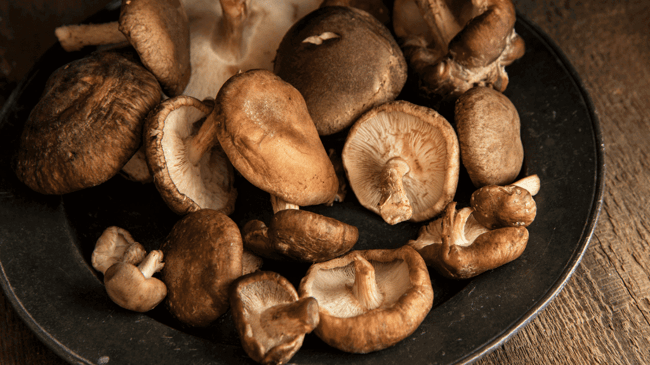
Shiitake mushrooms are the second most widely cultivated mushroom in the world behind the button mushroom. Although many know it as a healthy and tasty addition to meals, it’s also been widely studied for its health benefits.
It’s said that eating two-to-three shiitake mushroom fruiting bodies a week could boost the immune system - but there is more than just hearsay to back up the potential health benefits of shiitake mushrooms and heart health.
In particular, shiitake mushroom consumption is connected to lowering bad cholesterol levels in the body.
For example, in several studies done by the same group of researchers, healthy, young women were given dosed shiitake mushroom supplements over the course of seven days to test cholesterol levels. During that period of time, researchers saw the women’s cholesterol decrease 7-12%. It should be noted that dried mushroom supplements produced a greater effect.
As we noted above, the high fiber makeup of mushrooms make them a strong contender for natural options to fight heart disease. Shiitake mushrooms contain about 25-35% soluble and insoluble dietary fiber, of which 20-25% is made up of cancer fighting beta-glucans. This fiber helps to maintain healthy cholesterol levels in the body and protect blood vessels.
In another study conducted on rats, the phenolic compounds found in shiitake mushrooms were tested as a combative compound against plaque buildup linked to higher blood pressure and reduced circulation. Regular shiitake mushroom consumption was shown to reduce blood pressure and improve circulation in rats across the study - both of which are key to overall heart health.
Well, shiitake…that’s that. Makes sense why shiitake mushrooms have been nicknamed “heart-healthy shiitake.”
If you're ready to start adding shiitake mushrooms to your diet, here's how!
Heart benefits of oyster mushrooms

Last but not least, we’re talking about oyster mushrooms. These beautiful mushrooms come in various colors and are considered one of the best edible types of fungi. Why? Because they have a high protein content, high digestibility, immense amounts of fiber, and 15-20% makeup of cancer-fighting beta-glucans.
Despite there having only been a few small human clinical trials and various animal studies showing the mushroom’s potential cholesterol and blood sugar lowering effects, scientists are intrigued by oyster mushrooms’ potential ability to help with overall heart health and wellbeing.
For example, one of those studies showed that when 44 volunteers with type 2 diabetes ate 3-4 grams of freeze-dried, powdered oyster mushroom supplements, along with glucose and water on a daily basis, blood sugar levels declined 15-16.5% and insulin levels increased by 21-22% when compared to the control group.
While oyster mushrooms are the least studied of the three, clinical trials are ongoing and we can surmise that there is a clear linkage between oyster mushroom consumption and heart health benefits based on initial findings. We’re excited to see what information comes out on this species as scientists dig deeper and study it more intensively with human cardiovascular health.
Thinking about trying oyster mushrooms? Check out these gourmet recipes!
The proper dosage of mushrooms for heart health
When thinking about adding medicinal mushroom supplementation into your heart health regimen, please consider that dosage differs from person-to-person based on weight, height, health status, and gender. The general recommendation for dosing with overall heart health and support in mind is 6 grams daily - that’s equal to about 1 teaspoon per day.
An important note about medicinal mushroom supplementation and heart health: Please consult a doctor if you are experiencing heart health problems before you start introducing medicinal mushroom supplements into your routine.
Taking medicinal mushroom supplements for heart health
As mentioned above, it’s vitally important to work with your doctor when incorporating supplements into your heart health routine - this goes for medicinal mushroom supplements as well.
Medicinal mushroom supplements come in a few main product types:
- Mushroom powder: Powdered mushrooms have been used as a supplement for decades. People typically mix it into their favorite drink of choice or steep it for 10-15 minutes to drink as a tea. We put together some of the best reishi power brands here.
- Mushroom extract: Extract takes various types of mushroom powder and boils it down using a non-alcoholic liquid boiling process to make a liquid extract. It is then freeze dried to convert it back into a powder format. Similar to the powder, this product can easily be added to your favorite beverage or food item or made into a tea. Here are some of the best mushroom tincture brands.
- Mushroom extract capsules: If powder products aren’t for you, consider taking it in a capsule format. Here are some of the best capsule brands.
Remember that mushrooms need to be heated and extracted in order to get full access to the beta-glucans. Making your mushroom powder as a steeped tea or buying trusted extracts which have already been processed for you will help you reap the full benefits of the products you’re consuming and will lead to better health outcomes.
Want to learn more about the health benefits of medicinal mushrooms? Browse our blog for more content.


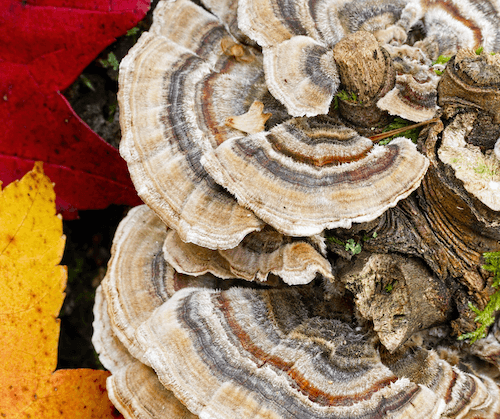


.png)
